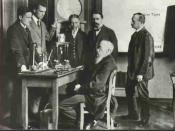Foundations of Psychology � PAGE \* MERGEFORMAT �5�
Introduction
The foundations of psychology consist of many psychologists and the theories that each has personally developed that dictate the processes of human behavior and scientific methods. Theorists like Wilhelm Wundt who many consider being the originator of psychology and of course the first book that was written on psychology by Edward Titchener and William Jones share their thoughts and perspectives on human behavior and how they perform in different situations. This paper will identify the major schools of thought in psychology and examine underlying assumptions as well as identify the biological functions that link psychology to behavior.
Foundations
The Columbia Encyclopedia refers to psychology as the 'science or study of the thought processes and behavior of humans and other animals in their interaction with the environment' (Columbia Encyclopedia, 2010).
In psychology the attempt is made to comprehend the function of the mind in individuals and the behaviors behind them.
Many concepts such as emotion, perception, motivation, personality, behavior, brain functions and interpersonal relationships are explored to further understand the human mind and behavior.
Methods
Many methods have been developed in the world of psychology that has paved the way for psychologists to understand human behavior and find common ground. One technique used in the early stages of psychology was Wundt's method of introspection. Wundt's method required persons to describe their feelings and thoughts when they were offered stimulus and determined that the basic components of consciousness were sensations such as color and feelings (Kowalski & Westen, 2005).
Many parts of Wundt's teachings were developed by his only student at that time, Titchener who used Wundt's introspection method (structuralism) to reduce thought processes of the mind into a more easier to understand component.
Another method called functionalism, derived from another psychologist William...


